Nervous Democrats rally behind Biden to stop Sanders on Super Tuesday
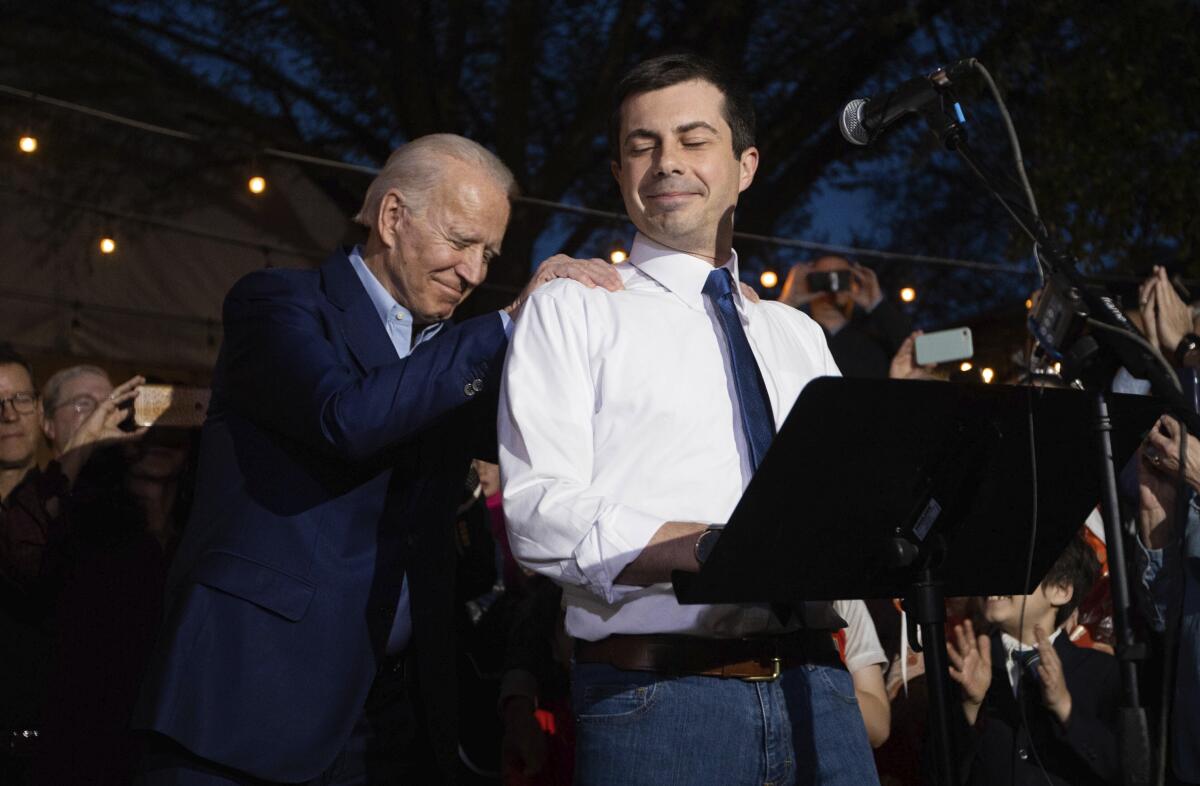
- Share via
Joe Biden fastened his grip on the establishment wing of his party Monday as prominent Democrats rallied behind the former vice president in an accelerating effort to thwart Bernie Sanders on the eve of the presidential campaign’s biggest and most consequential day of balloting.
One of Biden’s few remaining center-left rivals, Minnesota Sen. Amy Klobuchar, quit the race and joined former White House hopeful Beto O’Rourke at a Biden endorsement rally in Dallas, shortly after Pete Buttigieg flew to the city to deliver his support.
“He reminds me of my son Beau,” an emotional Biden said of the 38-year-old former South Bend, Ind., mayor — referring to his son who died at age 46 of a brain tumor. “I know that may not mean much to most people, but to me it’s the highest compliment I can give anyone.”
The appearance of the erstwhile antagonists was a strong sign of Biden’s rapid shift in fortune after a big win in Saturday’s South Carolina primary, which resuscitated his flailing candidacy following dismal showings in Iowa and New Hampshire.
It also underscored the desire of many in the party, panicked at Sanders’ success, to consolidate behind a more moderate alternative, and do so quickly. Former Democratic Senate leader Harry Reid of Nevada led a parade of party luminaries and elected officials rushing to announce their backing of Biden ahead of Super Tuesday.
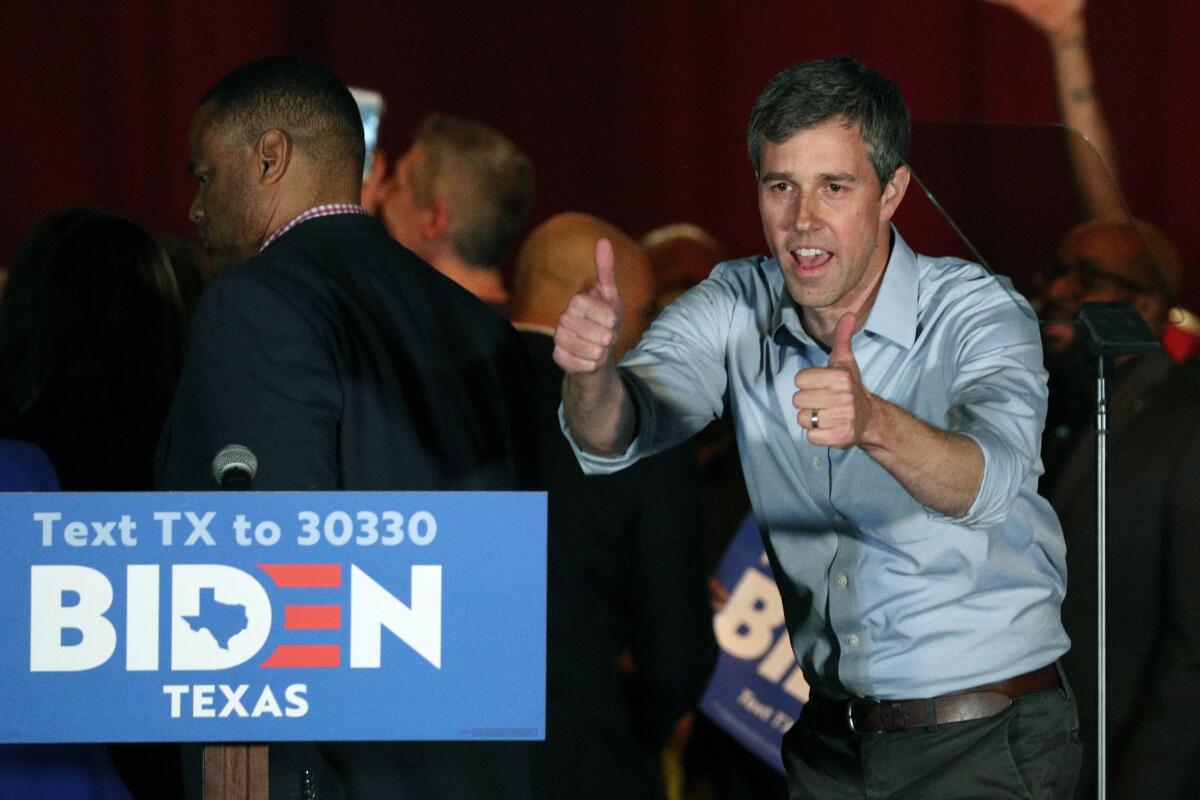
The Vermont senator used the snowballing pro-Biden movement to rally his supporters, many of whom are still angry at the perceived bias Democratic leaders showed four years ago when the democratic socialist lost the nomination to the more centrist Hillary Clinton.
“Look, it is no secret … that there is a massive effort trying to stop Bernie Sanders,” he told reporters during a stopover in Salt Lake City. “The corporate establishment is coming together, the political establishment is coming together, and they will do everything. They are really getting nervous that working people are standing up.”
On Monday, he won the formal backing of the liberal political action committee Democracy for America, an offshoot of former Vermont Gov. Howard Dean’s insurgent 2004 presidential campaign.
“Bernie Sanders has built a powerful multiracial, multigenerational movement and we’re excited to join the campaign at this critical moment in the Democratic race,” said the group’s chairman, Charles Chamberlain.
The machinations came as voters in 14 states, stretching from California to Vermont, prepared to divvy up more than a third of the delegates needed to win the Democratic nomination.
The Super Tuesday contests also presented the first test of strength for former New York Mayor Michael R. Bloomberg, who skipped the early contests and sunk an unprecedented fortune — hundreds of millions of dollars — into advertising aimed at vaulting him into late-starting contention.
His TV commercials, which were impossible to miss, were aimed at the same pragmatic-minded voters that Biden sought, touting Bloomberg’s stewardship of the nation’s biggest city and his “common-sense solutions and the ability to get it done.”
After months of stability, the competition among a historically large and diverse field turned virtually overnight into a race with fewer than a handful of serious contenders, all in their 70s: three white males and Massachusetts Sen. Elizabeth Warren.
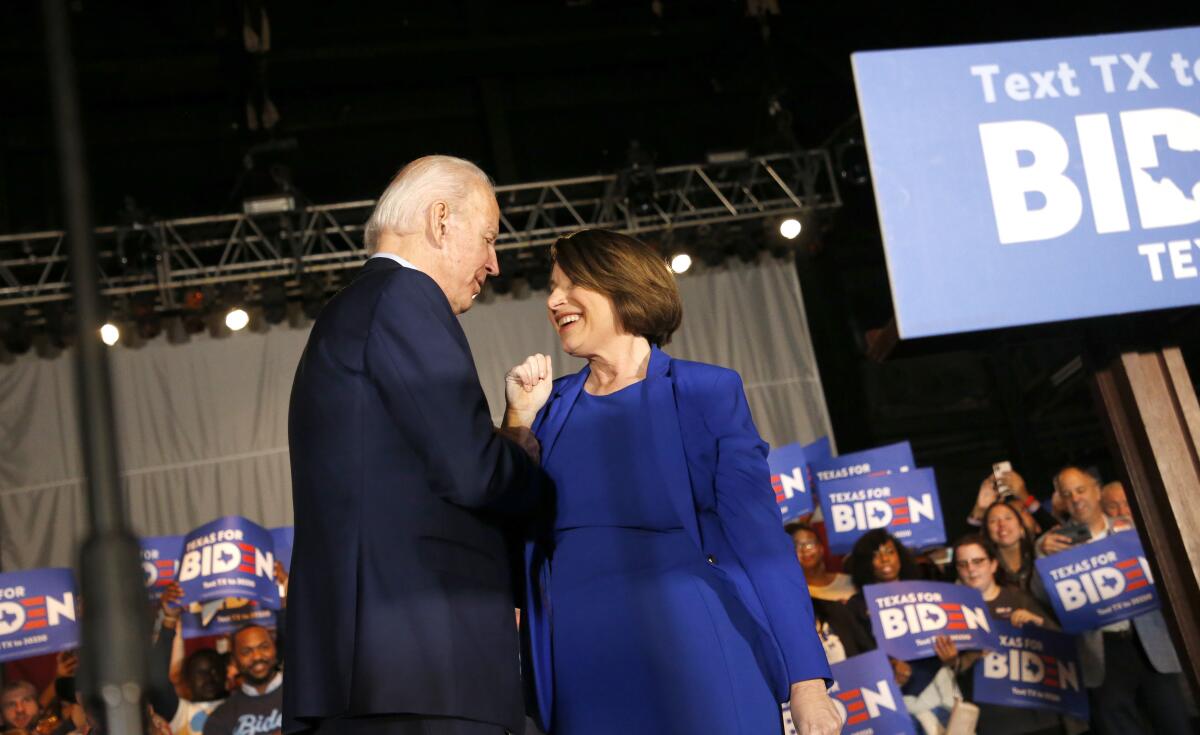
Klobuchar became the third Democrat in 48 hours to quit the contest, following hedge-fund billionaire Tom Steyer and Buttigieg. Though she turned in a number of well-received debate performances and finished a surprising third in the New Hampshire primary, the Minnesota senator was never a top-tier candidate and was not even a sure bet to carry her home state on Tuesday.
“If you feel tired of the noise and the nonsense in our politics, and if you are tired of the extremes, you have a home with me,” Klobuchar said, sounding familiar campaign themes as she left the race and delivered her endorsement. “And I think you know that you have a home with Joe Biden.”
After a series of single-state contests with momentum as their reward, the coast-to-coast balloting marks a dramatic shift in the Democratic contest.
“Plain and simple, it’s about getting delegates,” said Josh Putnam, a political scientist and expert on the nominating process, who publishes the election blog Frontloading HQ.
Under rules adopted by the Democratic National Committee, it takes 1,991 pledged delegates to secure the nomination at the Democrats’ July convention in Milwaukee. There will be 1,357 at stake on Super Tuesday, with the largest trove — 415 — coming from California.
Although the Golden State won’t decide the nominating fight, it will play a larger role than in previous presidential campaigns after advancing its primary from the end of the nominating season in June. Instead of coming to California to raise money and leaving to spend it elsewhere, candidates invested considerable time and effort campaigning here and addressing local issues; on Monday, Warren released a plan addressing farmworker rights.
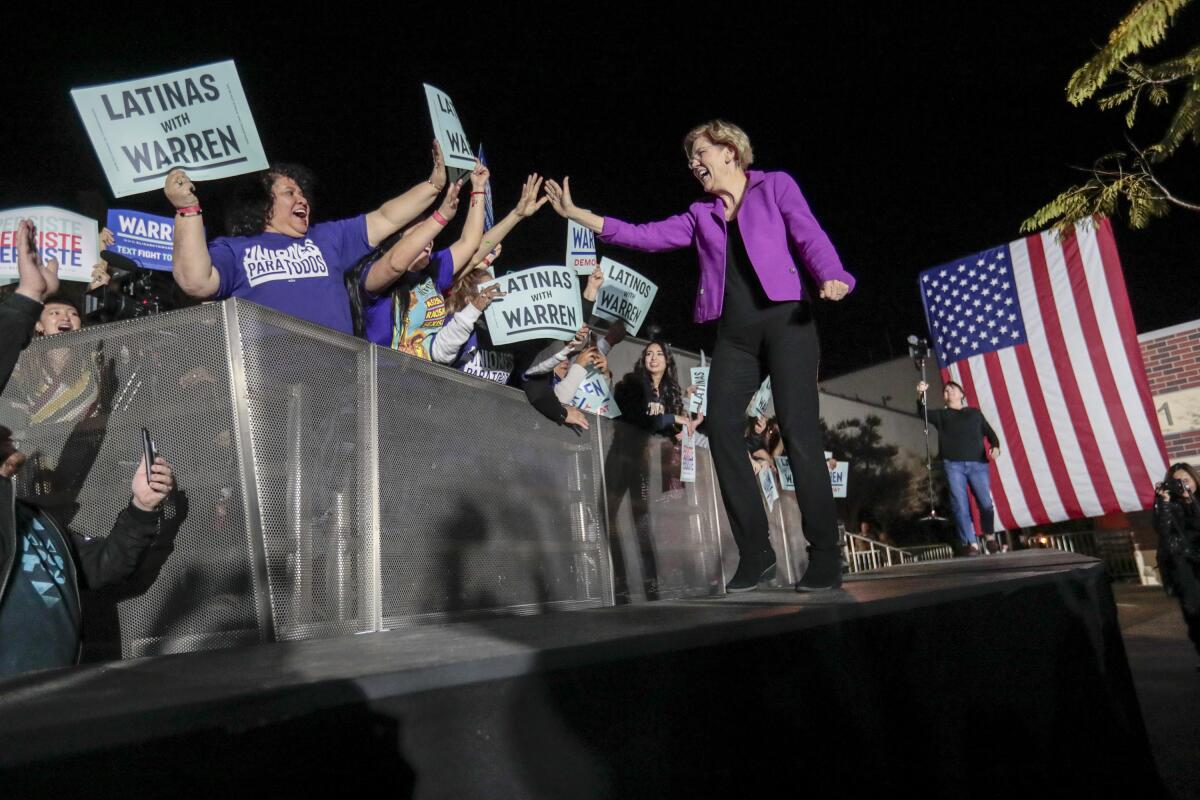
Appearing Monday night at East Los Angeles College, she took a swipe at Biden and Democrats rallying behind his candidacy. “No matter how many Washington insiders tell you to support him, nominating [a] Washington insider will not meet this moment,” Warren told a large and enthusiastic crowd of supporters who packed the school quad.
“Voters deserve a choice of someone with unshakable values who can also get things done, and bring all kinds of Democrats along with her,” she said.
The biggest question heading into Tuesday was whether a single candidate could win big and amass an insurmountable lead in delegates, hastening the end of the nominating fight, or if something akin to a split decision would keep the competition alive for weeks or even months to come.
Democrats do not award their delegates on a winner-take-all basis but rather through a more egalitarian formula based on two thresholds that make it harder to put the race away early. Candidates who win a minimum of 15% statewide receive a share of delegates. Separately, they can earn delegates by winning at least 15% of the support in individual congressional districts. (Or, in the case of Texas, state legislative districts.)
Sanders entered the day as the favorite to win the two biggest prizes, California and Texas, and was also competing strongly against Warren in her home state of Massachusetts. He was expected to easily win at home in Vermont and run strongly in nearby Maine.
Biden, who won overwhelming support from South Carolina’s African American community, was poised to perform well in several states — Alabama, Arkansas, North Carolina, Tennessee and Virginia — with sizable black populations.
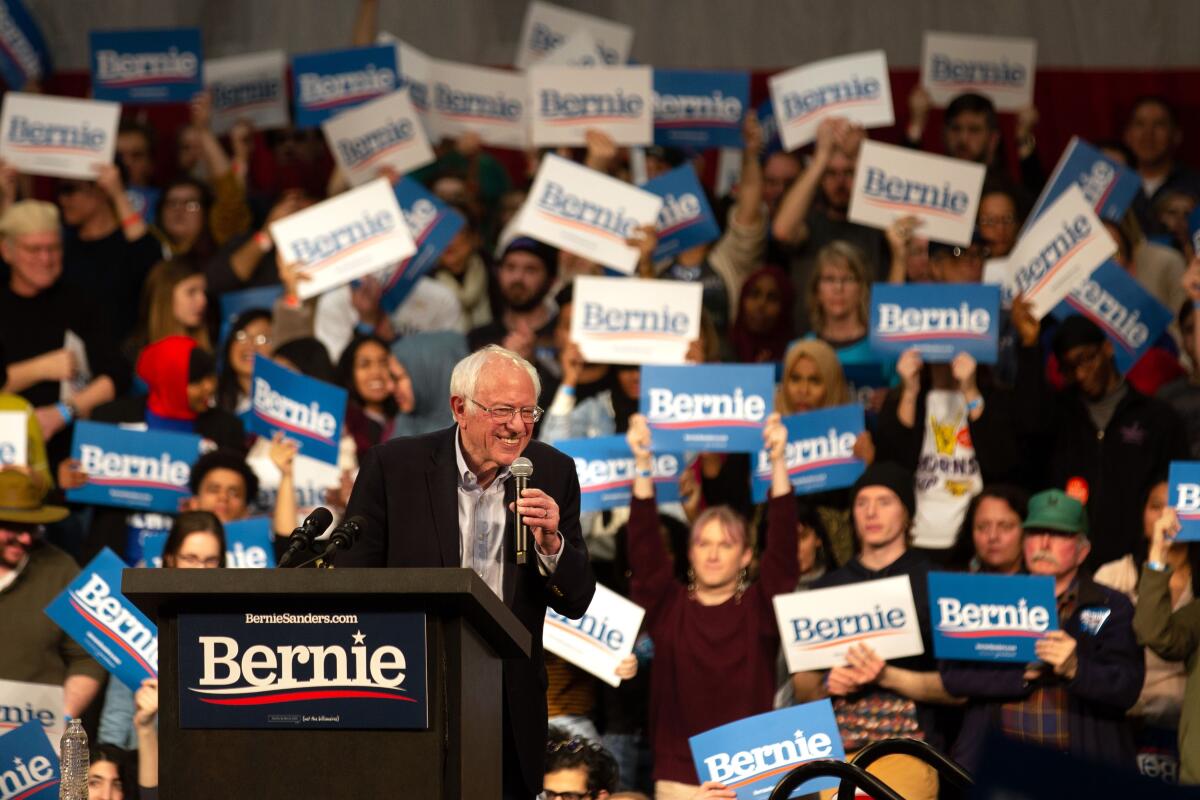
“If Bernie Sanders has a commanding performance, running the table, it’s probably over,” said Ace Smith, a Democratic strategist who helped guide California Sen. Kamala Harris’ unsuccessful presidential bid. “If there’s two or more candidates splitting delegates with him ... this show probably goes on.”
Eyeing the competition, President Trump did his part to stir up trouble renewing his assertion Democratic Party leaders were trying to cheat Sanders of the nomination. “They are staging a coup against Bernie!” he tweeted.
Sanders had a tart response. “President Trump, stay out of the Democratic primary,” he said on CNN. “Why don’t you do your job for a change as president. Stop lying, stop running a corrupt administration, pay attention to the American people.”
As big and politically important as Tuesday is, the balloting pales beside the epic election day of Feb. 5, 2008.
California along with 21 other states and the District of Columbia held contests in what remains the biggest single day of presidential primary voting ever. The result failed to settle the close contest between Democrats Barack Obama and Hillary Clinton, who battled to the final day of the primary season in June, when Obama finally clinched enough delegates to become the presumptive nominee.
Short of a blowout on Tuesday, this Democratic race could be headed for another prolonged fight.
Times staff writers Melissa Gomez, Arit John and Seema Mehta contributed to this report.
More to Read
Get the L.A. Times Politics newsletter
Deeply reported insights into legislation, politics and policy from Sacramento, Washington and beyond. In your inbox twice per week.
You may occasionally receive promotional content from the Los Angeles Times.











